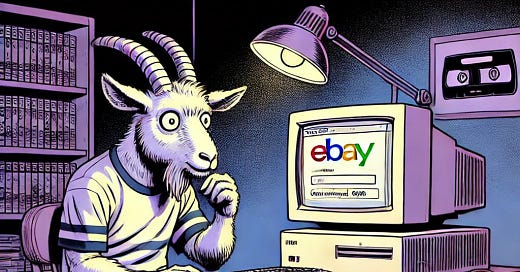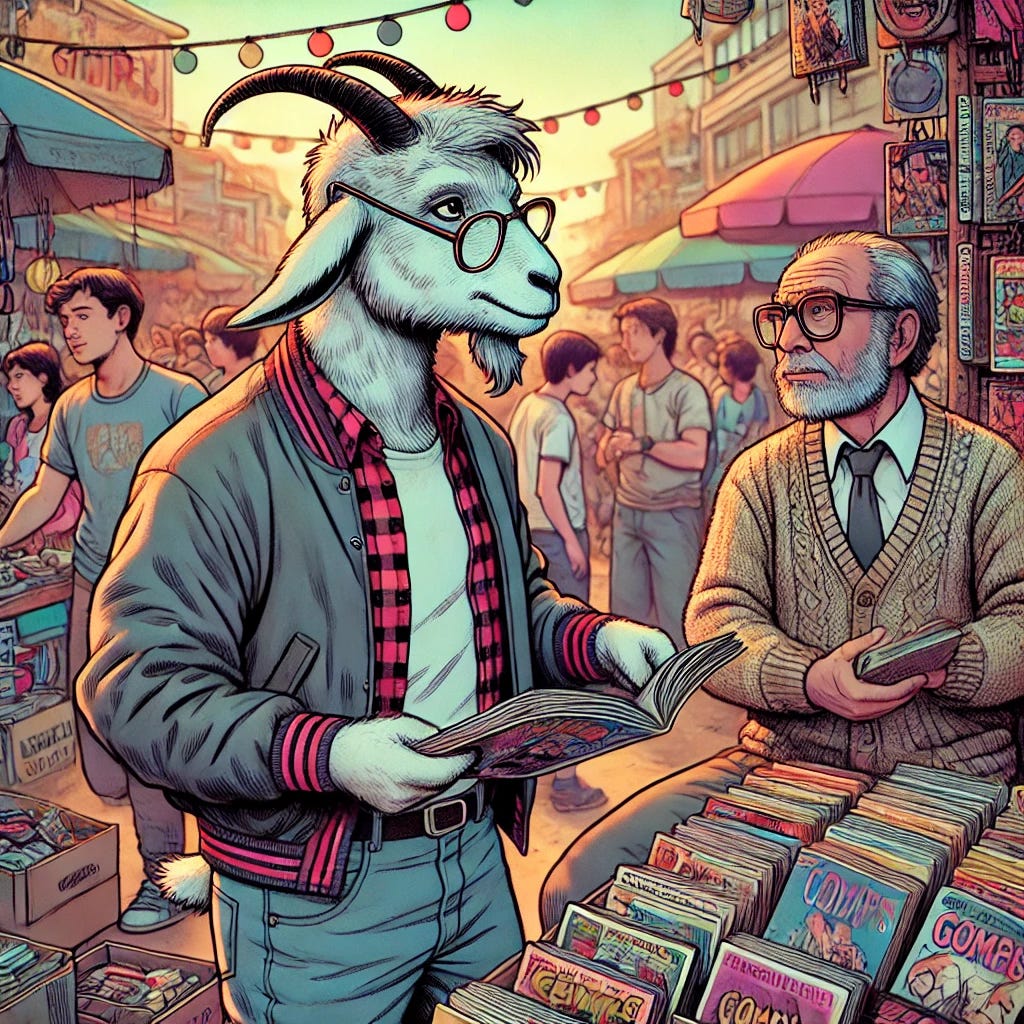eBay really shook things up during the late 90s.
I don’t just mean in my own life, although that’s certainly plenty true. I mean that the entire world changed a great deal because of this one company.
I remember the mania surrounding internet companies. It certainly seemed as though the future was bright for e-commerce, and in retrospect, that has clearly come to fruition: over $6 trillion in goods and services traded hands last year.
However, there was a time when this bright future seemed very far away. This was the world I want us to think about now, where the idea of doing business online was still really sketchy. Giving someone your credit card number online was tantamount to responding to a Nigerian-prince-scam email during the 2010s—it just seemed like a bad idea to do business online.
In 1997, right around the time I discovered eBay, all the online business in the entire world totaled less than $3 billion. That’s how much business Amazon’s Prime Day does in a few hours today. Suffice it to say: anyone doing business around this time was a pioneer.
The internet itself was very personal and niche-oriented, with a very high barrier for entry to have a webpage or presence of any kind. That, coupled with the aforementioned lack of trust, made it difficult for the general public to imagine doing business online.
eBay changed a lot of this quickly. I first started judo in January of 1997, and by the middle of the year, I was looking for old UFC events and other MMA or jiu jitsu-related videos.
I found some on the site, and I quickly got rid of any hesitation surrounding sketchy payments. It’s funny to observe how a fear will simply get shoved aside whenever there’s a passion involved—I became very comfortable with e-commerce very quickly as a result.
I think a lot of people think about their career paths in a very linear fashion. This was certainly the case when I grew up, with the idea being to go to college if you were so inclined, then settle into a job for about 35 years. Presumably, you’d retire and get some kind of pension at the end of your stay.
Fortunately for me, at a very young age, I was exposed to the idea that I could generate my own income. The kids I grew up with weren’t poor, but they certainly weren’t rich either. If any of us wanted something beyond the reach of our households, it was clear that it was up to us to figure out how to conjure up the cash we’d need.
This might involve picking up aluminum cans from the side of the road to sell for scrap metal, or it could mean running a lawn care business in my neighborhood. Maybe it meant going to trade shows with my dad one Christmas break so we could sell toys we had built together (mostly my dad).
Being exposed to these alternative income sources didn’t make them seem “alternative” at all. When I got my first job making an hourly wage, working for someone else, I just saw that as one more way to generate the income I needed to survive.
I can’t say that my plan all along was to go into business for myself, but I certainly figured out immediately that I preferred the ups and downs of entrepreneurship and hustling to the idea of making money for someone else, especially since there seemed to be little correlation between doing extra work and making extra money.
With eBay, I saw something profound. I saw an open market that anyone in the world could eventually use, even though virtually nobody was using it by the late 90s. I got to be one of the intrepid explorers of this new terrain. It was exciting!
eBay made it simple for everyone, because it created a platform. What I mean is that if you wanted to create a website to sell something you owned, you would need to do it from scratch. You needed some serious coding skills to even get started.
It was like trying to sell comic books on the side of the road from a booth you had to build yourself. eBay was more like a flea market with tons of premade individual booths, so you could just sit down at one of these and do business right away. You could set up your comic book booth right there in the flea market, and everyone in the world could come to your booth.
That’s what I did.
I bought some physical comic books at a flea market, then scanned them in (digital cameras back then were notoriously bad), and sold them online. It was thanks to a very simple platform that everyone was using that I was able to do this easily.
Selling to the entire world had its advantages, even with the online world being so much smaller than it is today. There were disproportionately fewer sellers, largely because there were so many barriers to entry.
I was so glad to jump through those hoops so I could be a part of this movement. It felt substantial and powerful, and I watched it change the world over the next three decades from the inside.
From 1997 until 2004, eBay exploded from under $100 million in total sales to over $34 billion. The market grew hundreds of times bigger while I was in the thick of things, and then I got out of the eBay game entirely to focus on jiu jitsu businesses.
I have eBay to thank for being quick to create my own shopping carts for doing business in the early 2000s. Success from eBay was easy to parlay into success on my own websites, where my focus shifted from e-commerce to journalism.
When my gym launched in 2006, doing business online gave me a strong competitive advantage. The same was true for US Grappling when my partners and I started accepting registrations and payments through our online system around 2007.
BJJ Path is one more project where I’ve been able to do some business online, and now three straight decades of practice has made creating content on a platform like Substack incredibly natural.
There’s no better way to close this out than to share Weird Al’s appropriately titled eBay, and to ask you about your own eBay experiences. Share them here!







I have never used that site- the auction element of it never appealed to me. I would much rather pay for something in full on or off-line.
Dear Andrew—There must be a “D’OH” fest going on that I stumbled upon by accident. Yesterday I posted a cartoon featuring Homer Simpson’s famous interjection, then I saw another cartoonist, UK’s Peter Brookes do the same on February 8, and now your post today. All I can say is, “D’OH!!”